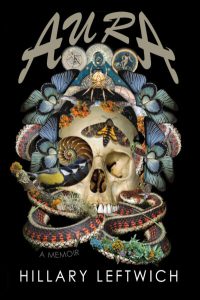Reviewed by Mar Colborn

From the moment I opened Aura, I was captured by details—a photo of a child’s medical alert bracelet, an escape plan, and the first of three definitions of the same word. Each detail brought questions, some of which I still have. Each section brought a clearer image of Leftwich as a woman, as a mother, and as a writer, and by the time I’d finished, Hillary Leftwich had left me speechless.
Leftwich’s control of detail is apparent throughout each section, as a series of moments come together in a complete, spellbinding story of the struggles of both parenthood and personhood, Aura commands attention to every detail Leftwich provides, intermingled with expertly selected documents and photos. The structure of the individual fragments—anecdotes, photos, spells, and promises to her son—weave themselves together into a unit that presents an image of strength. The strength to move forward, to forge a path in the wake of any number of challenges, is apparent in how Leftwich tackles deeply personal stories and creates something that evokes not only the pain but the triumphs in between.
Aura allows readers a glimpse into the relationship between a mother and her son, often addressing Leftwich’s son directly as she discusses the people who are instrumental in shaping both her life and his. In some moments a confession, in others a love letter, Aura is both a narrative and spiritual journey that forces readers to reckon with truths they might not otherwise take the time to consider. Difficult to put down, but remarkably easy to pick back up, Aura is an enthralling read. Readers should prepare to experience a wide range of complex emotions and consider the fundamental truths that exist in each human experience.
The relationships and people that Leftwich describes are beautifully complex and allowed to bloom to their full personhood, even as many of the details are limited to Leftwich’s relationship with them and their impacts on her and her son’s lives. The details of Colorado Springs, given throughout the story, bring familiarity to the setting without overwhelming the heart of the work.
Every section of Leftwich’s story delivers an emotional blow—sometimes from the relatability of reality as a woman, sometimes with aching sympathy for the deeply personal experiences Leftwich so bravely and beautifully shares. Each piece—whether prose, photo, spell, or promise—invites the reader to understand and learn something new about Leftwich and about the things she addresses. Aura shows a particular talent for structure, which gives Leftwich a powerful framework for her details, but more than that, it guides the reader through an emotional journey.
The candor with which Leftwich discusses painful, critical truths allows a unique window into issues that almost anyone can connect to, even if they haven’t shared most of her experiences. Not only does she have truth to share, her vulnerability in sharing her path to discovering her truth is stunning. The search for identity, the uncertainty of new responsibilities, and the terror of medical challenges are only a small sampling of the issues Leftwich discusses, and she tackles each of them with a unique, considered perspective. For both shared experiences and those entirely new to the reader, Leftwich gives a perspective that allows the reader to feel like they understand and are understood in turn.
Leftwich doesn’t shy away from difficult subjects, but the care with which she presents challenging and traumatic material makes Aura an excellent, thoughtful read. The awareness that Leftwich brings to her discussion of these difficult topics begins with the content warning in her note to readers—lovingly and carefully worded—and doesn’t end until the last page.
In each moment of Aura, Hillary Leftwich creates spaces in which readers can immerse themselves in her experiences, thoughts, and the intersection between the two. She provides a careful, though not softened, account of her experiences, even as they hurt. Readers learn to engage with lessons Leftwich had to learn on her own, all the while finding elements of themselves or their lives in the nuanced, vulnerable stories Leftwich so carefully crafts.
